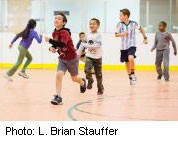 We know exercise benefits children’s growing bodies. But a study originally published in 2014 finds that exercise may help children’s minds too.
We know exercise benefits children’s growing bodies. But a study originally published in 2014 finds that exercise may help children’s minds too.
Researchers randomly assigned 221 children, aged 7 to 9, to either an after-school program with plenty of physical activity or a wait-list for the program. The after-school program occurred for nearly all of the school year (150 days). Over two hours, physical activity alternated with rest periods, resulting in about 70 minutes of moderate to vigorous exercise every weekday.
Although children in both the after-school program and the wait-list group experienced improvements in physical fitness, inhibition and cognitive flexibility, the after-school program participants made bigger gains in all three areas. Students who had the highest attendance in the program saw the biggest gains in mental skills.
The children took tests to measure their “inhibition” and their “cognitive flexibility,” which is basically their ability to switch between different tasks successfully, such as reading something and then answering questions about that reading, Charles Hillman, lead researcher, said.
Inhibition and cognitive flexibility are part of the brain’s executive function, which refers to a range of mental or “cognitive” skills that include memory, focus, attention and the ability to switch back and forth between tasks.
“I think these are the hardest evidence we have available that time spent in physical activities, which would include physical education and recess, not only doesn’t detract from academic goals, but it might enhance academic performance,” said Hillman, a professor of kinesiology and community health at the University of Illinois at Urbana-Champaign.
The program participants also showed improvements in attention that were not seen in the wait-list group, and they had smaller gains in body mass index (BMI) than the wait-list students.
Nathaniel Riggs, an associate professor of human development and family studies at Colorado State University in Fort Collins, said, “One important direction for future research is to actually measure physiological processes that may be able to explain these associations.”
One of the only weaknesses of the study is the inability to know how long the mental gains from the exercise might last, he said.
